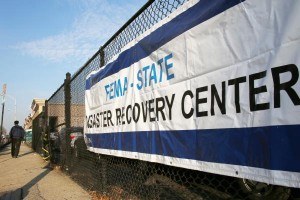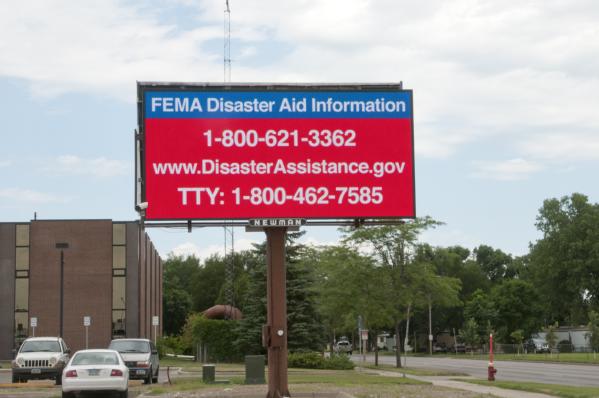With just a week to go before hurricane season, top jobs at the U.S. Federal Emergency Management Agency remain vacant and critics say that will make it harder for the government to respond to disasters.

The vacancies come on the heels of a tragic year for disasters. Of the five costliest hurricanes in U.S. history, three struck within weeks of each other in 2017 from Texas to the Virgin Islands, levying a combined financial toll of $265 billion and at least 200 deaths. Those disasters were followed by the worst wildfires in California’s history, straining FEMA, an agency whose full-time staff authorization has shrunk 25 percent since Hurricane Sandy in 2012.
Elizabeth Zimmerman, the agency’s top official during the Obama administration for responding to disasters, said the openings have left “gaping holes for the internal workings of FEMA.”
Brock Long, FEMA’s director, said that those vacancies won’t get in the way of his agency’s ability to respond to this year’s hurricanes. And he said FEMA is undergoing a major reorganization to leave it better prepared for disasters.
“I’ve got very talented, very experienced people,” Long said in an interview.
But former senior staff, auditors and members of Congress said there’s reason to be concerned, arguing that FEMA has yet to fix the problems laid bare by Hurricanes Harvey, Irma and Maria last year. And 2018 is projected by Colorado State University to be another worse-than-average hurricane season.
“FEMA will say that they’ve learned from 2017,” Representative Bennie Thompson, the top Democrat on the House Homeland Security Committee, said in an interview. “But to be honest with you, it seems that they’re just hoping for the best.”
Local officials in hard-hit communities complained about the slow pace of recovery last year. Government inspectors criticized FEMA’s “inadequate grant management” and its inability to deploy enough trained staff quickly. The general who ran the federal response to Hurricane Katrina, Russel Honore, said 2017 showed that the government “has to be prepared now to handle three category-4 storms a year.”
Eight months later, Long said FEMA is more ready this time around. Next week, the agency plans to announce that it’s creating a new “office of resilience” by combining existing units, Long said. He said the agency is also putting more supplies on Puerto Rico, improving its regional distribution plans and hiring more local staff.
But the agency has yet to release its so-called after-action report on last year’s storms, the document produced after each major disaster designed to identify flaws and how to fix them. Long said he doesn’t want to rush that process.
Vincent Picard, a spokesman for the National Security Council, said that the Trump administration “continuously works with Secretary Nielsen’s team at the Department of Homeland Security, FEMA and other federal agencies involved in emergency management and response to help ensure state and local authorities are receiving the planning and logistical support they need to mitigate risks to the full range of threats and hazards the nation faces.”
Craig Fugate, who ran FEMA for eight years under former President Barack Obama, said the recovery work from the 2017 storms – which has left countless survivors around the country living under tarps or in mobile homes – will make it even harder for the agency to respond to hurricanes this year.
“What if a hurricane strikes the Virgin Islands or Puerto Rico? What if a hurricane impacts Houston?” Fugate said in an interview. “What is FEMA prepared to do differently?”
Chris Currie, director for emergency management and national preparedness issues at the U.S. Government Accountability Office, said he’s seen no evidence yet that FEMA has gotten better at workforce management, which he called one of its biggest problems last year.
“They recognize that if they get another catastrophic disaster, they’re going to be stretched thin,” Currie said in an interview. “It’s kind of an unknown right now, the extent to which they’re ready to handle whatever may happen this year.”
FEMA got some of its harshest criticism for its process in awarding contracts, but Long said he plans no changes – because there’s nothing to fix. He said that much-cited examples of contracts gone wrong, such as a $156 million award to a woman in Atlanta to provide 30 million meals in Puerto Rico, were the exception. Out of almost 2,000 contracts, he said his agency had to cancel only three.
“So you tell me: Do we have a pretty successful way of doing contracting, or not?” he said. “I would argue that overwhelmingly the contracting piece was a large success.”
Others say the failure to prepare for this year’s hurricane season doesn’t rest solely with FEMA. Tim Manning, the agency’s deputy administrator for national preparedness under Obama, noted that after Katrina, Congress dramatically increased FEMA’s budget, staff and authority. This time around, he said, there appears to be less appetite for major reform.
Manning blamed the unwillingness of Republicans in Congress and the White House to talk about climate change. In March, the agency stripped all references to climate change, sea-level rise or similar terms from its four-year strategic plan.
“Without the guidance, the direction and requirement that rising sea levels, for example, be accounted for, then you’re going to miss it,” he said.
Was this article valuable?
Here are more articles you may enjoy.


 AIG’s Zaffino: Outcomes From AI Use Went From ‘Aspirational’ to ‘Beyond Expectations’
AIG’s Zaffino: Outcomes From AI Use Went From ‘Aspirational’ to ‘Beyond Expectations’  Claims Handling Breakdowns From LA Wildfires One Year on
Claims Handling Breakdowns From LA Wildfires One Year on  Besieged Berkshire Utility Tries to Rewrite Who Pays for Wildfires
Besieged Berkshire Utility Tries to Rewrite Who Pays for Wildfires  Moody’s: LA Wildfires, US Catastrophes Drove Bulk of Global Insured Losses in 2025
Moody’s: LA Wildfires, US Catastrophes Drove Bulk of Global Insured Losses in 2025 